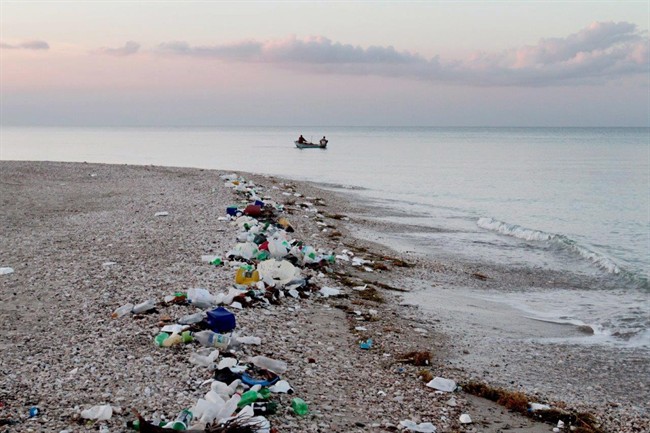An ominous prediction warns of oceans filled with plastic — so much that its mass would outweigh the waters’ fish.

The World Economic Forum has published a report predicting more plastic than fish in the world’s oceans by 2050.
READ MORE: Hunks of plastic found inside Fraser River steelhead
Plastic is everywhere: a cheap, versatile material that is — as the report notes — often used only once before being discarded.
“Plastics are the workhorse material of the modern economy – with unbeaten properties. However, they are also the ultimate single-use material,”
Martin R. Stuchtey from the McKinsey Center for Business and Environment says in the report.
The use of plastics has increased 20-fold over the last 50 years, and the report says it will double again in the next 20.
An estimated eight tonnes of plastics end up in the ocean every year, which is the equivalent of dumping the contents of a garbage truck into the ocean every minute, the report says. That is expected to double by 2050, and be four-fold by 2050.

Get daily National news
“The best research currently available estimates that there are over 150 million tonnes of plastics in the ocean today. In a business-as-usual scenario, the ocean is expected to contain 1 tonne of plastic for every 3 tonnes of fish by 2025, and by 2050, more plastics than fish (by weight).”
Plastic takes a million years to break down. However, when recycled plastic can be made into new bottles, carpeting, and even clothing. But too often that doesn’t happen, and it’s costing the world billions, aside from the environmental effects.
READ MORE: Canada’s place as ocean world leader at risk
Canadians produce about 31 million tonnes of garbage every year, and only recycle about 30 per cent of all refuse, according to the Recycling Council of British Columbia.
WATCH: Plastic warning from Vancouver Aquarium
The report finds that this “linear consumption pattern” is rampant, sending trillions of dollars annually to the landfill.
“Shifting to a circular model could generate a $706 billion economic opportunity, of which a significant proportion attributable to packaging,” the report states.
The findings are based on interviews with more than 180 experts and analysis of over 200 reports.
The report urges new technologies in material design, reprocessing and renewable sourcing; increased recycling infrastructure for developing nations, and more government action on implementing policies around the use of plastics.
You can read the full report here.
WATCH: Plastic pollution in the world’s oceans


Comments
Want to discuss? Please read our Commenting Policy first.